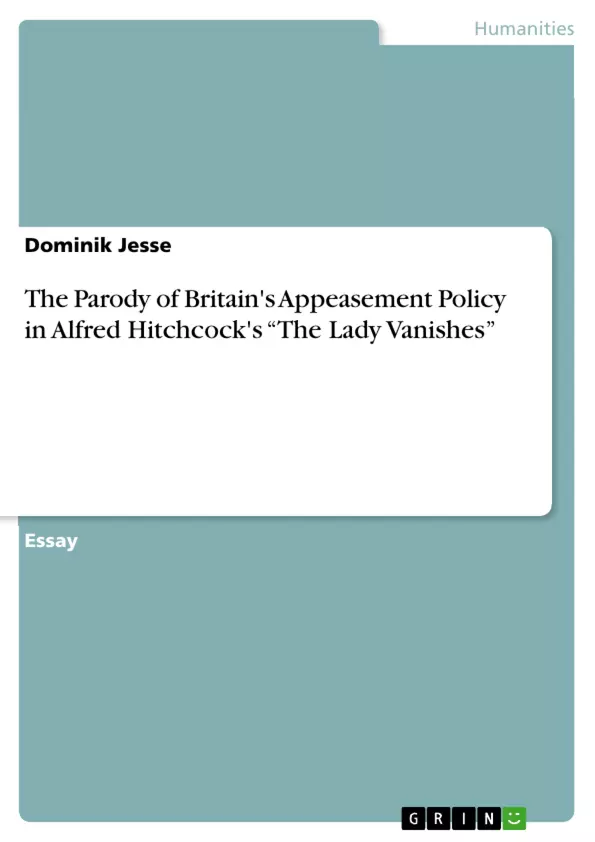What starts like a jaunty comedy soon turns into a suspense-packed spy film resulting in a trigger-happy fight for life and death. In Alfred Hitchcock's The Lady Vanishes a conglomerate of foolish British passengers travels on a train “adrift in a hostile Europe, surrounded by inimical foreigners in a world on the brink of war” (French 2012: “My favourite Hitchcock: The Lady Vanishes”).
When reviewers assess this exceptional espionage thriller as Hitchcock's "most political film" (Sweet 2007), they do it due to its "genuine sense of purpose" (Ryel-Lindsey 2007): The film was made in 1938, shortly before Neville Chamberlain's fatal agreement with Hitler, conceding ground to Nazi-Germany's aggressive territorial ambitions. Disapproving of his prime minister's indirect collaboration with the enemy, Hitchcock stages The Lady Vanishes as a critical statement on the policy of appeasement.
By presenting his characters the way he does, he parodies British blindness towards the rising threat of Hitler's Germany as a prerequisite for this very appeasement policy. Since not all of Hitchcock's characters in The Lady Vanishes are shown as unmistakable exponents of it, this essay aims at examining those who are. For lack of space, it will be focused on the characterisation of the appeasers par excellence, Mr. Todhunter (played by Cecil Parker), and the "stiff-upper-lip Oxfordians" (Ryel-Lindsey 2007) Caldicott and Charters (played by Nauton Wayne and Basil Radford).
After briefly defining appeasement along with the contemporary criticism of it, Hitchcock's artistic means of parody and his character drawing will be examined. The director strictly subdivides his film into three narrative sections (cf. Acherman 2008) not only to generate a remarkable arc of suspense, but also to satirically conduct the characters in question from innocent unworldliness to insight into reality.
Inhaltsverzeichnis (Table of Contents)
- introduction
- appeasing shadow hands: parody
- an avalanche: innocence
- on the train: collaboration
- the final shots: pacifism
Zielsetzung und Themenschwerpunkte (Objectives and Key Themes)
This essay examines the parody of Britain's appeasement policy towards Nazi Germany in Alfred Hitchcock's The Lady Vanishes. The essay focuses on how Hitchcock uses his characters to satirize British blindness to the rising threat of Hitler's Germany. The essay also explores how Hitchcock's use of symbols and clichés creates a humorous and satirical tone.
- The role of parody in Hitchcock's film
- The characterization of British appeasers
- The portrayal of British isolationism and ignorance
- The connection between appeasement and unconscious collaboration with the enemy
- The consequences of appeasement policy
Zusammenfassung der Kapitel (Chapter Summaries)
- Introduction: This chapter introduces the topic of the essay and provides context for Hitchcock's The Lady Vanishes. It discusses the film's political background and explains the concept of appeasement.
- Appeasing Shadow Hands: Parody: This chapter examines how Hitchcock uses parody to satirize British political blindness towards Hitler's Germany. The chapter also discusses the use of symbols and clichés in the film.
- An Avalanche: Innocence: This chapter analyzes the characters of Mr. Todhunter, Caldicott, and Charters, who represent the British mind-set of isolationism and ignorance. The chapter explores how these characters are initially portrayed as innocents abroad, but later lose their innocence as they become obstacles to the rescue of Miss Froy.
- On the Train: Collaboration: This chapter focuses on the second narrative section of the film, which takes place on the train. The chapter explores how the characters' insular indifference and obsession with their own interests lead them to unconsciously collaborate with the enemy.
- The Final Shots: Pacifism: This chapter examines the final shoot-out in the film, which forces the characters to face the consequences of their appeasement policy. The chapter discusses how some of the characters, particularly Mr. Todhunter, remain pacifistic and ultimately suffer for it.
Schlüsselwörter (Keywords)
The key themes and concepts explored in this essay include appeasement, parody, isolationism, ignorance, pacifism, unconscious collaboration, and satire. The essay also examines the representation of British character and the depiction of Nazi Germany in Hitchcock's film.
- Quote paper
- Dominik Jesse (Author), 2015, The Parody of Britain's Appeasement Policy in Alfred Hitchcock's “The Lady Vanishes”, Munich, GRIN Verlag, https://www.grin.com/document/305984



